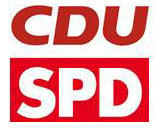Politics
Politicians vote no to a cap on directors’ fees
 Just as the negotiations on forming a governing coalition were entering the final stages, the CDU/CSU Christian Democrats and the SPD Social Democrats bowed to pressure brought to bear by the economics area of the CDU and leading institutions in the areas of finance and economics, to reject the proposed ceiling on the excesses paid to directors of stock market listed companies. No legally enforceable limit had been talked about. Surprisingly, the provision initially envisaged by law experts for the relationship between directors’ earnings and the average employee’s salary of market-listed companies to be made public was also rejected. This is what emerges from the third draft coalition contract between the two sides published on 26 November according to which the Chancellor feared a spate of disaccord driven by envy. Originally the maximum ratio between Board of Directors and average salary was to have been set by the general meeting. Now, all that remains is the laconic “In order for there to be transparency in verifying directors’ salaries, the decision on the sums to be paid to the Board of Directors will, in future, be made by the general meeting based on proposals put forward by the Supervisory Board.”
Just as the negotiations on forming a governing coalition were entering the final stages, the CDU/CSU Christian Democrats and the SPD Social Democrats bowed to pressure brought to bear by the economics area of the CDU and leading institutions in the areas of finance and economics, to reject the proposed ceiling on the excesses paid to directors of stock market listed companies. No legally enforceable limit had been talked about. Surprisingly, the provision initially envisaged by law experts for the relationship between directors’ earnings and the average employee’s salary of market-listed companies to be made public was also rejected. This is what emerges from the third draft coalition contract between the two sides published on 26 November according to which the Chancellor feared a spate of disaccord driven by envy. Originally the maximum ratio between Board of Directors and average salary was to have been set by the general meeting. Now, all that remains is the laconic “In order for there to be transparency in verifying directors’ salaries, the decision on the sums to be paid to the Board of Directors will, in future, be made by the general meeting based on proposals put forward by the Supervisory Board.”
Fears of expropriation looming
 Representatives of small shareholders are up im arms about the ruling on delisting handed down on 8 November last by the Bundesgerichtshof – BGH Federal court. The court had initially accepted that delisting for the regulated market did not erode shareholder protection to the right to ownership (art 14). Now, regular delisting of a stock-market listed company requires neither authorization by a company general meeting nor an offer on the part of the joint stock company itself or its major shareholder to purchase the stock owned by small shareholders. Nor would this diminish the shareholder’s status of company partner. Such was the ruling handed down by the BGH that flew in the face of the case law applied in the instance of Macrotron. SdK (Schutzgemeinschaft für Kapitalanleger the German Investors’ Association) now fears a spate of expropriation of minor shareholders. The discretionary power for delisting is now exclusively in the hands of the Board of Directors and the Supervisory Board with nothing in exchange for those holding a diversified portfolio. The Macrotron ruling of 2002 required a joint-stock company to obtain authorization by its general meeting to seek delisting and hence, by a simple majority of all shareholders. Furthermore the company itself or its major shareholder was required to make a public offer to buy out the other shareholders – this in order to give the shareholders the chance to sell their shares directly to the company or its major shareholder instead of on the stock market. “Now”, comments Hans-Martin Buhlmann, VIP eV, “anyone, even the Board of Directors of a DAX-listed company, can delist with no obligation to consult the shareholders – something has to be done”.
Representatives of small shareholders are up im arms about the ruling on delisting handed down on 8 November last by the Bundesgerichtshof – BGH Federal court. The court had initially accepted that delisting for the regulated market did not erode shareholder protection to the right to ownership (art 14). Now, regular delisting of a stock-market listed company requires neither authorization by a company general meeting nor an offer on the part of the joint stock company itself or its major shareholder to purchase the stock owned by small shareholders. Nor would this diminish the shareholder’s status of company partner. Such was the ruling handed down by the BGH that flew in the face of the case law applied in the instance of Macrotron. SdK (Schutzgemeinschaft für Kapitalanleger the German Investors’ Association) now fears a spate of expropriation of minor shareholders. The discretionary power for delisting is now exclusively in the hands of the Board of Directors and the Supervisory Board with nothing in exchange for those holding a diversified portfolio. The Macrotron ruling of 2002 required a joint-stock company to obtain authorization by its general meeting to seek delisting and hence, by a simple majority of all shareholders. Furthermore the company itself or its major shareholder was required to make a public offer to buy out the other shareholders – this in order to give the shareholders the chance to sell their shares directly to the company or its major shareholder instead of on the stock market. “Now”, comments Hans-Martin Buhlmann, VIP eV, “anyone, even the Board of Directors of a DAX-listed company, can delist with no obligation to consult the shareholders – something has to be done”.
Paul Signer has again increased his holding in Celesio. Now, his Elliott International hedge-fund, almost on its own, is in a position to prevent anyone taking over the Stuttgart-based distributor of pharmaceuticals. According to a communiqué on the right to vote, the American millionaire owned 42.8 million shares of Celesio on 19 November, corresponding to a minority block of 25.16 percent; 19.11 percent in shares and 6.05 percent in convertible bonds. Up to now, it was common knowledge that Elliott possessed 21.13% of Celesio through various companies. At the end of October, American pharmaceutical distributor McKesson, put forward a takeover bid for Celesio offering 23 Euros per share on the condition of obtaining at least 75 percent of the shares and convertible bonds. The Americans have already reached an agreement with Haniel the major shareholder from whom they will purchase 50.01%. The overall worth of the transaction is some 6.1 thousand million Euros, including bonds. Singer, on the other hand possesses enough stock to scupper the deal also because there are other investors ready and willing to follow him. Those in the know hint that other hedge-funds already own between three and five percent of Celesio. Elliott’s real intentions are still not clear, and the fund itself is making no statements. Elliott will probably push for McKesson to increase its bid, at the risk, however, of killing it.















